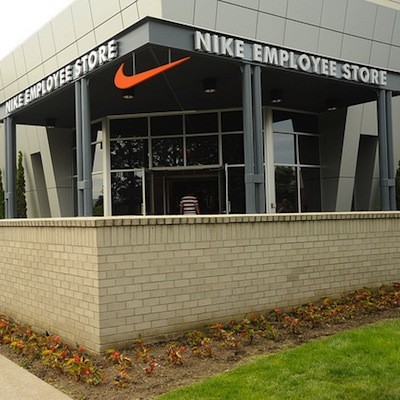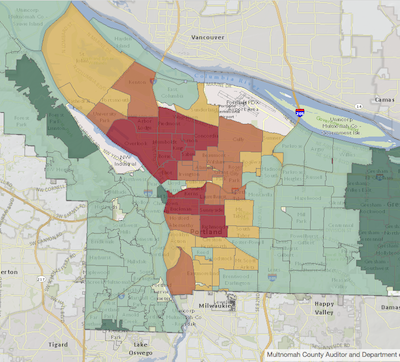Multnomah County Hires Fewer Small and Minority Businesses





 Email to a friend
Permalink
Email to a friend
Permalink
Monday, March 09, 2015
Joanna Evoniuk, GoLocalPDX Contributor
Multnomah County awarded fewer contracts to state certified minority, women, and small businesses over the past three years while increasing contracts to other firms.
Businesses that qualify for the certification of Oregon Minority Business Enterprises, Women Business Enterprises, and Emerging Small Businesses (MWESB) were awarded 60 contracts from the county in 2012. However, that number dropped to 40 in 2013, and dropped to just 33 in 2014.
During that time, contracts between Multnomah County and businesses without at MWESB certification increased -- from 97 contracts in 2012 to 144 in 2014, according to the 2014 Multnomah County Purchasing Report.
“I’m never excited about a drop, but a number of things affect the outcome,” said Lee Fleming, the supplier diversity officer for Multnomah County Purchasing who works closely with MWESB firms in the county. “It causes us to look at what we are doing and what we can do better.”
Multnomah County awards hundreds of contracts every year, for everything from professional services to construction. As the economy continues to rebound, so does the number of contracts. According to Fleming, 2014 was a record year for the total number of contracts handed out.
For small and minority business owners, winning contracts to work on large projects can be game changing, according to Debbie Rockway, owner of AllSource Construction Supply.
“It’s so helpful for a small business to come on a big job site, and to hopefully learn, grow, and be part of a big project you never would’ve had the chance to be on,” Rockway said. “There’s no way I would be where I am today without them.”
Rockway’s business is certified with the state of Oregon as a Women Business Enterprise. Prior to that, she was registered as a Small Emerging Business, but has grown past the size requirements.
Hardships for Small Businesses
Small businesses make up 95 percent of all businesses in Multnomah County, according to Multnomah County's purchasing department. Making a smaller business operation succeed, even in a healthy economic climate, takes an enormous effort, Rockway said.
“It’s hard. It’s amazing the amount of numbers you have to put in when you’re trying to grow your business,” Rockway said. “You sacrifice a lot and taxes take a lot.”
Oregon was ranked as one of the least friendly states for small businesses for its taxes and regulations by the Small Business Policy Index.
When companies certify as MWESB with the state, it puts them on a list government agencies search for contract bids. Yet many eligible businesses do not register with the state as MWESB, and the number who do has dropped in recent years, according to Fleming.
“The process to apply has very cumbersome, and that’s aggravating as a business owner trying to get things in place,” Fleming said.
The state has been working to streamline the application process, Fleming said, and is aiming for the process to take 10 days, rather than year, as it has in the past. Already the wait time is down to a month.
The county and the City of Portland have been working with small and minority business through education and outreach programs to help inform and guide them through the process.
Awarding Contracts
Fleming said there are a number of factors for the drop in minority contracts, including fewer MWESB-certified businesses applying for bids.
The Sellwood Bridge project is also winding down, which caused a jump in MWSEB contracts at its inception.
Many private companies have their own goals for subcontracting jobs to MWESB firms. The main contractor for the Sellwood Bridge project, Slayden, planed to have 20 percent of subcontracting done by MWESB firms.
When Multnomah County sends out quote estimates $10,000 to $150,000 at least three must be from Certified MWSEB companies.
“We are looking for these companies,” Fleming said. “All citizens should have an opportunity to participate in business.”
However, Fleming said it is still a highly competitive process, with a best value analysis required for every quote. And businesses must be proactive in their contract search, according to Rockway.
“Being certified gets you nothing—you have to go out and get bids, just like any big business. Certification doesn’t hand you anything,” Rockway said.
Related Slideshow: Slideshow: The 14 Biggest Business Stories of 2014
From legal marijuana to civic battles with rideshare giant Uber, Oregon had another year of growth in 2014, coming in as the ninth fastest-growing economy in the nation.

Prev
Next
#14
Vegan Condoms Launch in Sustainable Portland
Sustainability and safe sex were married in Portland this year. Well, sort of. The world’s first fair-trade, vegan, sustainable condom launched in Portland in October. Seventh Generation founder Jeffrey Hollender teamed up with daughter Meika, 26, to create Sustain. The Vermont-based company launched exclusively in the Pacific Northwest because of its leading sustainability chops. The condoms are made from ethically grown rubber, carry the Forest Stewardship Council’s blessing, and are packaged in recycled material. Find them at Fred Meyer, Green Zebra, PCC, and Amazon.
Read more

Prev
Next
#13
Low Worker's Compensation Premiums Boost Oregon Economy
Oregon’s economy emerged as one of the nation’s fastest-growing since 2010, and one factor giving the state a competitive edge is low worker’s compensation premiums. Oregon has the 9th lowest workers’ compensation premiums in the country, with employers only paying an average of $1.85 per $100 of an employee’s payroll to insurance companies who fund worker compensation benefits. The low rates help economic growth and employment in the state. Lower insurance premiums mean lower operating costs for business, helping them become more successful. Some states have almost three times those insurance rates. A growing manufacturing sector is aiding Oregon’s rapid growth.
Read more

Prev
Next
#12
Bitcoin Trend Grows in Portland With Pioneer Square Mall ATM
You can now do business up to $100,000 with the digital currency Bitcoin.
The crypto-currency generated buzz in the Rose City this year when an ATM, designed to convert Bitcoin into American dollars, opened in one of downtown Portland’s busiest malls. You can’t hold it in your hand, it’s not issued by a government or bank, and its value is based solely on the demand for it at a given time. The controversial currency, valued in and around $400, were worth $1,000 a year ago. Portland banker Mike Fors founded Bitcoin NW, the state’s only brokerage firm capable of converting up to $100,000. Enthusiasts say it can save money, as it has no fees unlike credit cards. Approximately 25 businesses in the Portland area use Bitcoin.
Read more

Prev
Next
#11
Magazine Agents, Animal Hospitals Get Most Business Complaints
The five types of businesses in Oregon with the highest number of complaints may surprise you. According to the Better Business Bureau, statistics for individual businesses were not available, but could be sorted into business “type.” Magazine subscription agents topped the list with 439 complaints, and animal hospitals came in second with 361 complaints. Auto dealers, new and used, vied for third position. Used auto dealers garnered 268 complaints in Oregon while new car dealers ranked third with 277. Financial services received 232 complaints, finishing fifth.
Read more

Prev
Next
#10
Nike Adds 2,000 Jobs in Government Tax Deal
A sweetheart tax deal for NIKE meant job growth for Oregon. NIKE added more than 2,000 new full-time positions since Jan. 1, 2012, as part of a job-expansion agreement with the state of Oregon, according to a report from the Governor’s Office. The deal between NIKE and the state is based on a law enacted in 2012 that enables companies to maintain the same “single-factor-sales” tax rate for at least 20 years in exchange for adding a minimum of 500 new jobs and capital investments of at least $150 million. Sept. 30, 2014, Nike had 8,709 full-time employees, up 2,084 from 6,625 Jan. 1, 2012. The company must invest $150 million in capital expenditures, which it has yet to do, to fulfill the second condition of the contract.
Read More

Prev
Next
#9
Oregon Poised to Become Drone Economy Hub
As the nation awaits an FAA ruling on unmanned commercial aircraft, Oregon is poised to become a hub for the drone economy, potentially bringing in thousands of jobs and billions of dollars in investment to the state. The unmanned aircraft would benefit two of Oregon’s biggest industries -- agriculture and forest fire fighting. Of six drone test-sites in the U.S. approved by the FAA, three are in Oregon: Tillamook, Pendleton and the Warm Springs Reservation. There are over 100 companies in Oregon working in the field of unmanned aerial vehicles in some capacity. The industry is expected to generate hundreds of billions of dollars per year, with approximately 80 percent of the industry used for agricultural purposes. Oregon State University is already involved with projects using drones for agricultural testing and scanning for crop and soil quality. The drone economy could create between 70,000 and 100,000 jobs in the US.
Read more

Prev
Next
#8
Weekend Closures in Old Town Entertainment District Hurt Businesses
Drunken revelers are safer and committing fewer crimes, but businesses are taking a financial hit. Businesses in Old Town and China Town reported a drop in margins -- to the tune of 30 percent -- after city-imposed weekend street closures took effect. The area’s business coalition reported businesses enclosed in the Old Town entertainment district saw drops in business between 20 and 30 percent. The weekend closures launched as a pilot project in Dec. 2012, and stuck because violence, liquor violations, and disorderly conduct dropped dramatically. Some business owners were concerned the city did not ask for their input. The district closes the blocks between Northwest 2nd and 4th avenues from West Burnside to Northwest Everett Street between 10 p.m. and 3 a.m. Friday and Saturday.
Read More

Prev
Next
#7
Some Portland Homeowners Pay Disproportionate Property Tax
A study and mapping tool released by the Multnomah County Auditor in October revealed homeowners paid drastically different levels of tax for properties of the same value, depending on where they lived. Residents can use the Inequities in Multnomah Property Taxes tool to compare property values and taxes by neighborhood. The study solidified anecdotal evidence that homeowners were paying more taxes in some areas for homes with similar property values. For example, a house in Southeast Portland’s Brooklyn Neighborhood that costs $400,000 can pay up to $3,500 more in property taxes than a house of the same value in North/Northeast Portland’s Eliot neighborhood.The disparity ultimately has a negative affect on first-time homebuyers and low-income residents.
Read more

Prev
Next
#6
No Salt on Roads is Costing Oregon's Economy
Portland’s snow-induced paralysis became a source of humor and frustration this year, particularly among transplants. All jokes aside, a state ban on salting roads could cost Oregon's economy $40 million each day snow and ice closes businesses, transit and schools. #Snowmageddon rocked the city in February, and whispers of a coming snowstorm in November closed Portland Public Schools. Portland uses a magnesium chloride liquid de-icer, rather than salt, although officials concede salt is more effective. When a state's commerce is shut down during a snowstorm, its total economic losses range from approximately $80 million to $700 million per day, according to a 2014 report released by the American Highway Users Alliance. The Oregon Department of Transportation holds storage and equipment costs, combined with environmental impact, outweigh its benefits.
Read more

Prev
Next
#5
Portland Struggles to Enforce Airbnb Permits
Another online service operating in quasi-legal terms in 2014, Airbnb allows residents to rent their homes short term through the company’s website. Sept. 2, the city began accepting permits for residents looking to rent out rooms through Airbnb, after a public struggle with neighborhood advocates. The $180 permit allows renters to operate legally by passing a city inspection. But few are playing ball and enforcement of the law is complaint-driven. Despite more than 1,000 rentals listed Portland's Airbnb.com page, only a fraction of the listings carry a permit from the City of Portland. By mid-September, the city had received only six applications for Airbnb-style short-term rentals. The number grew only slightly through the remainder of the year. In March, the San Francisco-based company announced its plan to open offices in Old Town. Portland’s city council minted the new rules in July and set up a tax on the rentals.
Read more

Prev
Next
#4
Cover Oregon Debacle Gives Oracle a Wakeup Call
Widespread issues with Cover Oregon, the state’s failed healthcare exchange, preceded organizational changes at software giant Oracle. CEO Larry Ellison, who founded the company in 1977, resigned and appointed himself Chief Technology Officer in September. This preceded a damning October report from state-contracted business consultant Clyde Hamstreet. The Cover Oregon debacle offers insight into technological issues Oracle, GoLocal Mindsetter James Reilly writes. Going into 2015, Oregon and Oracle are suing each other, and those seeking coverage from the state exchange must enrol with national platform healthcare.gov. Oracle did not keep up with industry shifts to cloud-based computing, Reilly writes. The Cover Oregon debacle pushed Oracle to a point of action now 20 years in the making.
Read more

Prev
Next
#3
Rents increase as young, educated adults flock to Portland
More than 25,000 people move to Portland from across the country every year since 2011. The continued migration strains the city’s supply of one-bedroom apartments and studio lofts, driving up the price of rent. Vacancy in Portland is a low 3.44 percent, compared to the national average of 6.49. House-hunting for rentals is increasingly competitive and expensive. The average rent for a one-bedroom apartment in Portland in 2010 was $987, which increased to $992 in 2011, $1,012 in 2012 and $1,036 last year. The average price for a one-bedroom apartment in downtown Portland is around $1,751. GoLocal rounded up apartments you can rent for $1,500. The city is projected to gain an addition 112,000 united over the next 20 years.
Read More

Prev
Next
#2
Legal Weedonomics: State Laws Stand in Way of Marijuana Businesses
When the green industry got the green light in Oregon with the passage of ballot measure 91, consumers and entrepreneurs alike rejoiced. Although marijuana does not become legal until July 2015, Oregon is gearing up for the economic influx. Once the legal market gets its footing, everything from dispensaries to retail shops, smoking lounges and online payment start-ups are looking to cash in. But, current legislation including bans on smoking in places of employment and public spaces stand in the way of lounges. Laws against extracting active ingredients prevents a potentially behemoth ‘edibles’ industry. A tax on the plant will support schools, law enforcement and health. In Vancouver, a battle to legalize smoking lounges was supported by Mayor Tim Leavitt, who saw it as a business opportunity.
Read More

Prev
Next
#1
City Fights Back After Uber Rolls Into Portland Illegally
The controversial rideshare company halted operation in Portland Dec. 21, after a courtship, a launch, and a lawsuit. Uber launched Dec. 5 in Portland, despite regulations that prevented the company from operating. The city fired back, levying over $67,000 in fines against Uber, and requested a court injunction to stop operations. An agreement is in the works while the city puts together a task force to reform taxi laws. The company circled Portland, the largest U.S. city without a ridesharing service, launching in Vancouver, Salem and Eugene. Uber launched Dec. 5 in Portland, despite regulations that prevented the company from operating. The city fired back, levying over $67,000 in fines against Uber, and requested a court injunction to stop operations. An agreement is in the works. Uber operates in over 100 cities around the world, often illegally. April 9, 2015, the city will hear the recommendations.
Read more
Enjoy this post? Share it with others.





 Email to a friend
Permalink
Email to a friend
Permalink


































Follow us on Pinterest Google + Facebook Twitter See It Read It